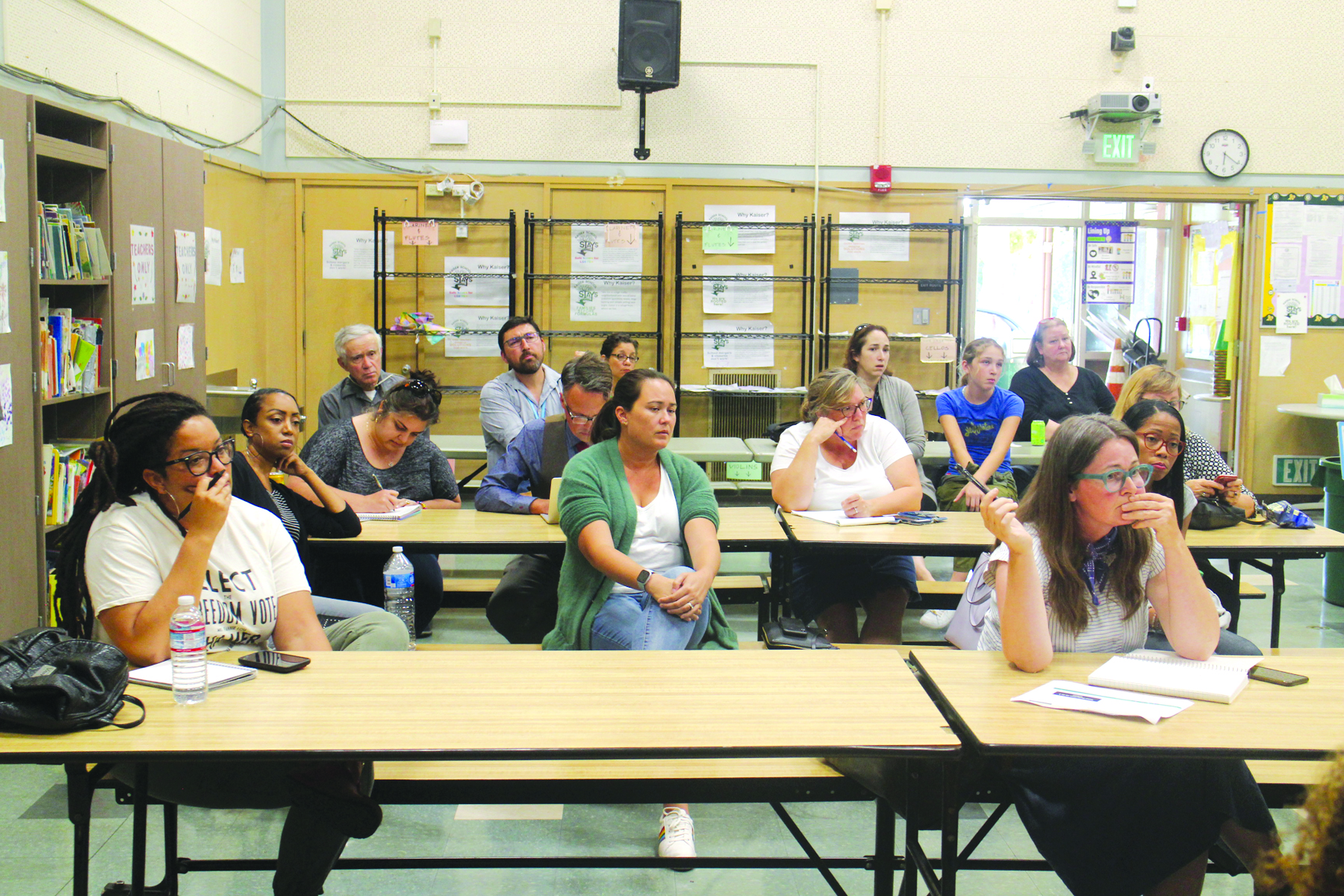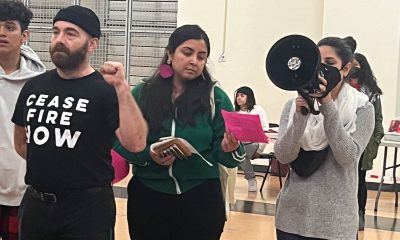Bay Area
Parents Push Back Against School District Plan to Close and Merge Schools

Running into a wall of outrage from school families and community groups, the Oakland Unified School District (OUSD) administration and the Oakland Board of Education are struggling to come up with a coherent rationale and reasonable plans to close Oakland neighborhood schools that they hope Oaklanders would be willing to accept.
OUSD is currently operating under the supervision and fiscal austerity regime imposed by the State of California’s local representatives – the Alameda County Office of Education and the state-funded Fiscal Crisis Management and Assistance Team (FCMAT) – which are demanding that the district close 24 or more schools in the next few years, which variously has been called right-sizing, merging, relocating or consolidating.
None of the euphemisms for school closing seem to have gained much credibility from parent groups that are fighting to keep from losing their established school communities or face major upheavals as they move to new schools or try to adapt to new groups of students and teachers on their campuses with what they fear will be inadequate planning, lack of resources and little to no school community input.
In past presentations to the board and press interviews, FCMAT has said the district has too many schools and cannot afford to operate them, while acknowledging that school closures do not save money.
This year, the administration, under Cohort 2 plans, is urging the school board to close the Henry J. Kaiser campus and merge the school’s students, families and teachers with Sankofa Academy in North Oakland.
Variations of the plan, backed by individual school board members, would merge Kaiser and Sankofa with Peralta Elementary School or Santa Fe Elementary (which is presently closed but temporarily serving the Glenview Elementary community, while their campus is being rebuilt).
The Cohort 2 plan also calls to expand Melrose Leadership Academy and move Oakland SOL, which are outgrowing their campuses. Impacted schools could be Sherman Elementary, Frick Middle School and Maxwell Park.
The district says the merging and closing of schools will free up resources and funds, according to the OUSD Blueprint for Quality Schools Action Plan, is to create “high quality and sustainable schools in every neighborhood,” particularly in flatland schools that have been historically under-resourced and have faced institutionalized disparities.
Speaking at last week’s board meeting, Kaiser parents pleaded with the board not to close their school.
In a Facebook post, the Kaiser advocacy Committee urged the pubic to attend last week’s school board meeting to “make your voice heard and stand with us as we advocate that the board do right by Oakland children and put a stop to all school closures and consolidations.”
Facing criticisms as a privileged hill school, Kaiser parents emphasized the school’s diversity, high test scores and significantly increasing test scores for African American students.
Kaiser’s student population, which is fairly stable at 268 students, is 21 percent African American, 16 percent Latino and 36 percent white. A majority of the students come from outside the school’s neighborhood attendance area.
If the school were closed, students in the Kaiser attendance area would be eligible to attend Chabot Elementary, where 3.9 percent of the students are African American. Students from outside the Kaiser attendance area would go to Sankofa or could apply to another school in the district.
Parents from Sankofa told the school board that they are open to merging with any other school at their campus, as long as they receive resources and support from the district.
Over the course of a number of years and different superintendents, according to parents and district administrators, many promises were made to Sankofa, including active support, new programs and other resources. But the promises were never kept, and existing resources continued to dry up.
At present, Sankofa has 189 students, 71 percent African American, 11 percent Latino and 3 percent white.
Speakers at the board meeting from Oakland SOL, Frick Middle and Melrose Leadership Academy told the board they needed more time to make sure the moves at their campuses would strengthen, not undermine their schools. Rather than the board adopting a timeline that institutes changes next school year, they asked board members to give them an additional year to develop collaborative relationships with their newly merged school communities.
Most of the school board members who spoke supported the closure of the Kaiser site but had differing ideas about combining the Kaiser, Santa Fe, Peralta and Sankofa school communities. However, breaking with the board’s approach, Boardmember Rosie Torres sharply criticized the plan.
She said the district’s promises of supporting the schools – “the ideas, the dreams and pipelines – are not realistic in my view” because OUSD does not have sufficient central office staff to do the work.
When the district closed Roots Academy in June, it promised the school community resources. “(But) we barely offered Roots boxes, when we told them (they would receive) counseling and help transitioning. We’re not doing it right. Let’s not pretend we’re going to do it any better next time.”
She criticized the superintendent’s and staff’s timeline as unrealistic.
Interrupting Torres, School Boardmember Gary Yee accused her of disrespecting the superintendent. “I find that offensive,” he said. Supt. Kyla Johnson-Trammell told Torres said the board member should not disrespect her staff.
The board is scheduled to vote on the Cohort 2 mergers and closures at its Wednesday, Sept. 11 meeting.
Activism
Oakland Post: Week of April 24 – 30, 2024
The printed Weekly Edition of the Oakland Post: Week of April 24 – 30, 2024

To enlarge your view of this issue, use the slider, magnifying glass icon or full page icon in the lower right corner of the browser window. ![]()
Alameda County
DA Pamela Price Stands by Mom Who Lost Son to Gun Violence in Oakland
Last week, The Post published a photo showing Alameda County District Attorney Pamela Price with Carol Jones, whose son, Patrick DeMarco Scott, was gunned down by an unknown assailant in 2018.

Publisher’s note: Last week, The Post published a photo showing Alameda County District Attorney Pamela Price with Carol Jones, whose son, Patrick DeMarco Scott, was gunned down by an unknown assailant in 2018. The photo was too small for readers to see where the women were and what they were doing. Here we show Price and Jones as they complete a walk in memory of Scott. For more information and to contribute, please contact Carol Jones at 510-978-5517 at morefoundation.help@gmail.com. Courtesy photo.
Bay Area
State Controller Malia Cohen Keynote Speaker at S.F. Wealth Conference
California State Controller Malia Cohen delivered the keynote speech to over 50 business women at the Black Wealth Brunch held on March 28 at the War Memorial and Performing Arts Center at 301 Van Ness Ave. in San Francisco. The Enterprising Women Networking SF Chapter of the American Business Women’s Association (ABWA) hosted the Green Room event to launch its platform designed to close the racial wealth gap in Black and Brown communities.

By Carla Thomas
California State Controller Malia Cohen delivered the keynote speech to over 50 business women at the Black Wealth Brunch held on March 28 at the War Memorial and Performing Arts Center at 301 Van Ness Ave. in San Francisco.
The Enterprising Women Networking SF Chapter of the American Business Women’s Association (ABWA) hosted the Green Room event to launch its platform designed to close the racial wealth gap in Black and Brown communities.
“Our goal is to educate Black and Brown families in the masses about financial wellness, wealth building, and how to protect and preserve wealth,” said ABWA San Francisco Chapter President LaRonda Smith.
ABWA’s mission is to bring together businesswomen of diverse occupations and provide opportunities for them to help themselves and others grow personally and professionally through leadership, education, networking support, and national recognition.
“This day is about recognizing influential women, hearing from an accomplished woman as our keynote speaker and allowing women to come together as powerful people,” said ABWA SF Chapter Vice President Velma Landers.
More than 60 attendees dined on the culinary delights of Chef Sharon Lee of The Spot catering, which included a full soul food brunch of skewered shrimp, chicken, blackened salmon, and mac and cheese.
Cohen discussed the many economic disparities women and people of color face. From pay equity to financial literacy, Cohen shared not only statistics, but was excited about a new solution in motion which entailed partnering with Californians for Financial Education.
“I want everyone to reach their full potential,” she said. “Just a few weeks ago in Sacramento, I partnered with an organization, Californians for Financial Education.
“We gathered 990 signatures and submitted it to the [California] Secretary of State to get an initiative on the ballot that guarantees personal finance courses for every public school kid in the state of California.
“Every California student deserves an equal opportunity to learn about filing taxes, interest rates, budgets, and understanding the impact of credit scores. The way we begin to do that is to teach it,” Cohen said.
By equipping students with information, Cohen hopes to close the financial wealth gap, and give everyone an opportunity to reach their full financial potential. “They have to first be equipped with the information and education is the key. Then all we need are opportunities to step into spaces and places of power.”
Cohen went on to share that in her own upbringing, she was not guided on financial principles that could jump start her finances. “Communities of color don’t have the same information and I don’t know about you, but I did not grow up listening to my parents discussing their assets, their investments, and diversifying their portfolio. This is the kind of nomenclature and language we are trying to introduce to our future generations so we can pivot from a life of poverty so we can pivot away and never return to poverty.”
Cohen urged audience members to pass the initiative on the November 2024 ballot.
“When we come together as women, uplift women, and support women, we all win. By networking and learning together, we can continue to build generational wealth,” said Landers. “Passing a powerful initiative will ensure the next generation of California students will be empowered to make more informed financial decisions, decisions that will last them a lifetime.”
-

 Activism4 weeks ago
Activism4 weeks agoOakland Post: Week of March 27 – April 2, 2024
-

 #NNPA BlackPress4 weeks ago
#NNPA BlackPress4 weeks agoBeloved Actor and Activist Louis Cameron Gossett Jr. Dies at 87
-

 Community2 weeks ago
Community2 weeks agoFinancial Assistance Bill for Descendants of Enslaved Persons to Help Them Purchase, Own, or Maintain a Home
-

 Activism3 weeks ago
Activism3 weeks agoOakland Post: Week of April 3 – 6, 2024
-

 Business2 weeks ago
Business2 weeks agoV.P. Kamala Harris: Americans With Criminal Records Will Soon Be Eligible for SBA Loans
-

 Activism2 weeks ago
Activism2 weeks agoOakland Post: Week of April 10 – 16, 2024
-

 Community2 weeks ago
Community2 weeks agoAG Bonta Says Oakland School Leaders Should Comply with State Laws to Avoid ‘Disparate Harm’ When Closing or Merging Schools
-

 Community1 week ago
Community1 week agoOakland WNBA Player to be Inducted Into Hall of Fame
























































